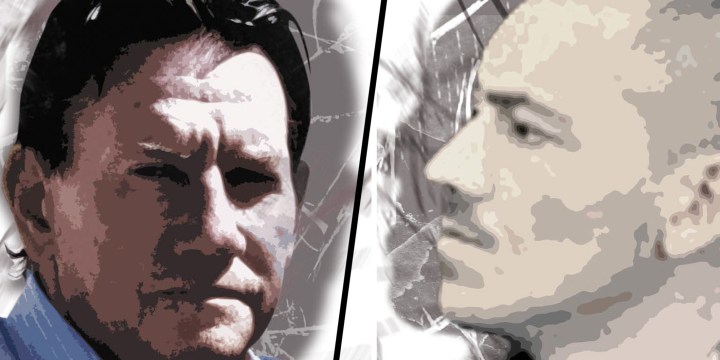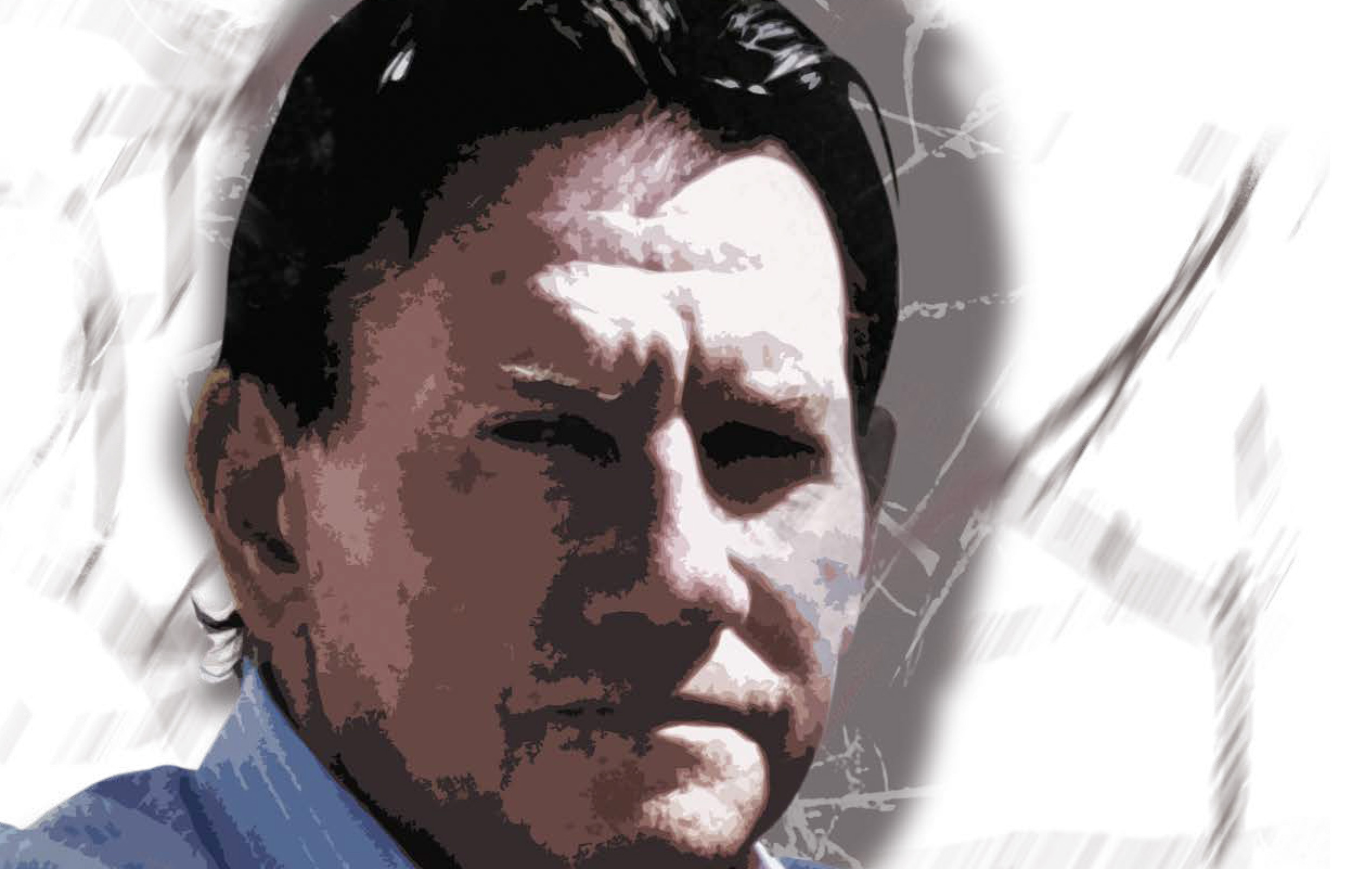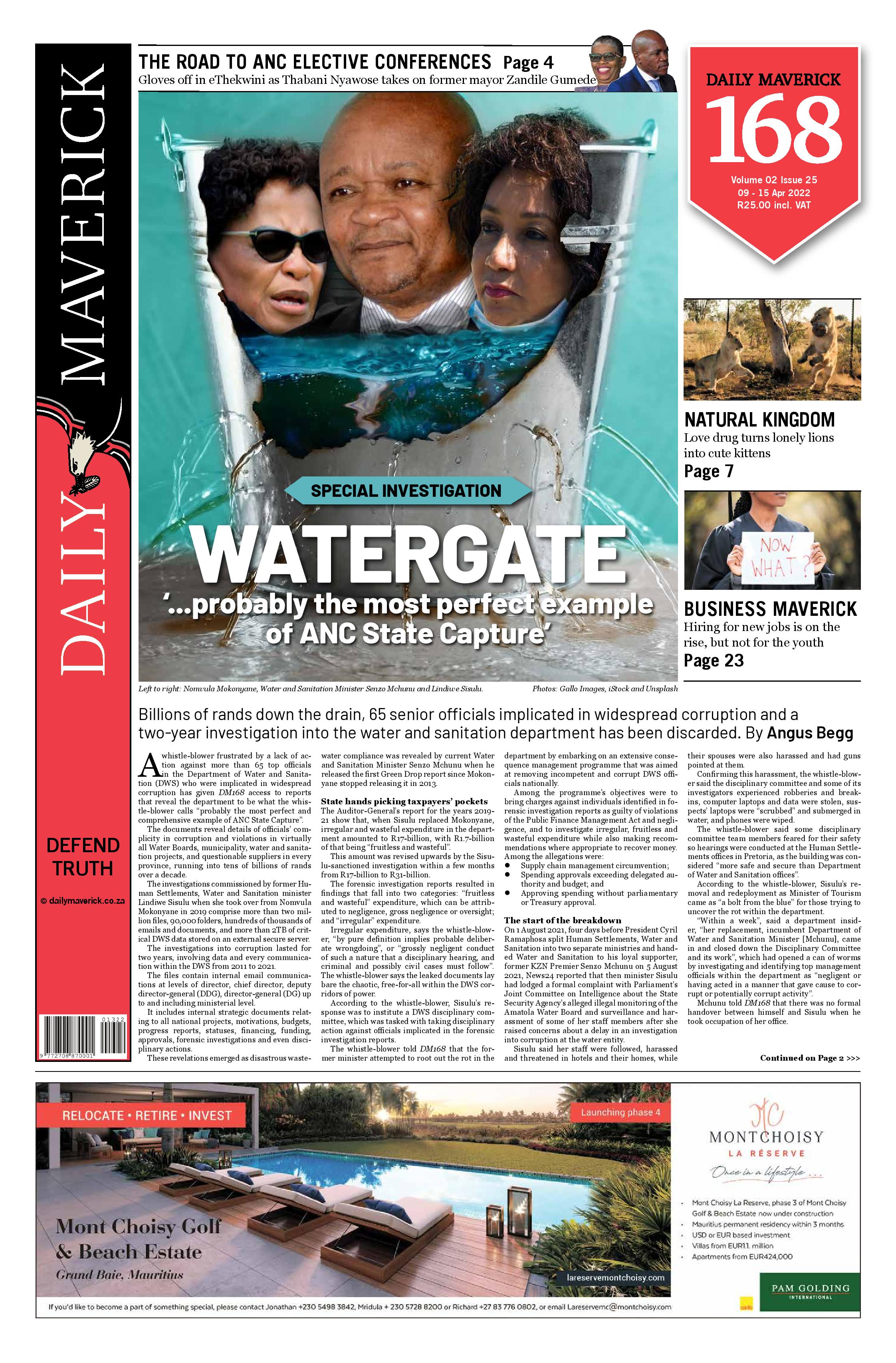BOOK EXCERPT
Meeting murderers: Tormented by my father’s killing, my quest for answers begins

What drives a person to viciously murder another person? And what happens to the family when one of their own is murdered? In her book, Unforgiven - Face to Face with my Father's Killer, Liz McGregor weaves a tale seldom told as she unpacks the death of her father. Here are two excerpts.
Robin McGregor, an older man who has recently moved into a small town outside Cape Town, is brutally murdered in his home. Cecil Thomas is convicted for the crime, but his trial leaves more questions than answers. As much as his daughter Liz McGregor tries to move beyond her grief – she finds new work, she even discovers love – she still wants answers. What drove Thomas to torture and kill a complete stranger?
The author meets the murderer’s family and discovers that he comes from a loving, comfortable home. He is educated and skilled; there is no apparent reason for his descent into delinquency. After protracted obstruction from the prison authorities, she finally gets to confront him, but not without putting herself in danger. She finds answers, but not the answers she is looking for.
Unforgiven tells a story seldom told: what happens to a family when one of their own is murdered? In a country where, year upon year, tens of thousands of people lose a loved one to violence, where restorative justice is preached but not practised, where prisons are universities of crime, what would it take to achieve redemption? For the victim, the perpetrator and the country? These are excerpts from Unforgiven chosen by author Liz McGregor for DM168.
It is at night that the Obz Café comes alive. Now, in the bleary mid-morning, it is half-empty, nursing a hangover. Towards the back, well away from the big plate glass windows, stands Chris Malgas, an anomalous figure in his fatigues and his erect, soldierly bearing.
We introduce ourselves and quickly get down to business. Sitting opposite him, still raw and jittery, I pour out my story. As usual, the tears come when I get into the detail of the murder. He doesn’t say anything, just sits completely still, chin resting on steepled hands, gazing unblinking at me. It’s slightly unnerving but I am left in no doubt that I have his undivided attention.
I ask the question that has been tormenting my nights, trying to make it sound business-like because I am embarrassed by my feebleness: “If I go ahead with this, will I be putting myself in danger? Is it stupid to put myself on the radar of Thomas and the vicious gangsters he is enmeshed with? Will I be looking over my shoulder for the rest of my life?”
He answers with a question, phrased in the respectful third person of formal Afrikaans, his eyes boring into mine: “Can Liz not do it? Can Liz stop?” For a moment, I am taken aback. I had been expecting something measured, analytical. Some case studies, some statistics perhaps, a weighing up of the pros and cons.
But then it comes to me how intuitive, how astute his question is. He has instantly summed the situation up and given me the only appropriate response. Because of course I can’t stop. I’m so fired up with adrenaline, so aquiver with nervous energy that words of caution would have no effect.
All I need is the right person to hold my hand: someone with the right networks, knowledge and experience. Someone with empathy and integrity. Someone I can trust. In that instant, I know I have found him. Chris Malgas has just retired after 40 years as a warder at Pollsmoor Prison in Cape Town, the biggest prison in the Western Cape and nerve centre of the Number prison gangs. An expert in the ways of gangs, he works as a consultant, educating prison staff nationwide in their ways. Still deeply networked but no longer constrained by the inertia and politics of the prison bureaucracy, he can get things done. I am to pay him but his fees are modest.

Robin McGregor was murdered in his home in Tulbagh in August 2008.
A ‘torturous’ journey to the heart of her father’s killing: Some hope but few consoling answers
Out spills more of my angst. How shackled I feel by racial shame. How burdened by our country’s history, by the atrocities committed by people of my skin colour against those of Thomas’s. How that knowledge undermines me and makes me question, in my darker moments, my right to hold Thomas to account.
Chris fixes me with a pull-yourself-together look and fires off more questions: “Was Liz the architect of apartheid?” “Did Liz fight apartheid?” “Are you doing what you can to make things better now?” I answer meekly: No and yes and yes. “Stop the guilt and the shame then! Don’t let your shadow block out the light! Your focus must be daddy. Cecil Thomas not only took your father’s life, he also harmed your family and brought fear into your lives. You have every right to call him out.”
Something changes in me with this conversation. It feels that, after weeks of grasping at straws, of batting feebly at half-closed doors, I finally have traction.
I tell him about my conversation with Patricia. I want to know how much weight to attach to it. His response is firm: “She is trapped in that gangster world and must find ways to survive it. It was a mistake to talk to her. Don’t talk to her again.”
I gaze past Chris to the street outside. A homeless man with shaggy dreadlocks framing a thin face knocks on the glass, trying to get the attention of a young woman typing intently on her laptop. In another lifetime, this was my hood.
I lived in Observatory for a few years in the pre-democracy era, first as a student and then as a young reporter. Still then mostly the domain of the white working class, rents were low and the Victorian terraced houses large enough to share with three or four friends. I remember earnest Das Kapital reading groups, furtive political meetings and Security Policemen hovering in unmarked cars. I remember a brief passionate love affair with a comrade: the different shades of our skin making it an illegal act, which only added to its intensity.
Now the remnants of the white working class have moved north and it is more racially mixed than most inner-city areas. By Cape Town standards, property is relatively cheap and it is popular with emerging artists. And students.
Chris is not comfortable here. “Where you get students, you get drugs,” he says bluntly. “Where you get drugs, you get gangsters. Next time we meet in the southern suburbs.”
Excerpt 2
The nights are longer now, with autumn deepening its grip. It is still dark at 6am and raining heavily when I arrive at Pollsmoor, where I have arranged to meet Chris Malgas. He might work there no longer but it appears it remains his centre of gravity. As I draw up, he emerges from the sentry box and hurries towards the car, hunched against the rain. “And how is Liz?” he asks, settling into the passenger seat. “Ok,” I say. Although in truth I’m bloody terrified. I feel a kind of liquidness, as if I’m lying half-submerged in a fast-flowing stream, hurtling head-first, eyes shut, to god knows where. I have no idea where the stream will take me but I feel fatalistic about it. I will land where I will land.
We are on our way to Brandvlei Maximum Prison near Rawsonville to witness Rev Clayton’s Restorative Justice programme in action.
We leave the car in a near deserted car park and run through the rain to the entrance. I am frisked in a booth by a female warder and my bag searched – I had been warned not to bring a cellphone – and then we are led through a series of interleading corridors which culminate in a large circular room. Even the smallest slit of a window is heavily barred.

Cecil Thomas was convicted and sentenced to 30 years in prison, but his trial left more questions than answers.
I am very aware that the exit is far away and I am trapped in a room with some of the most dangerous men in the country.
There are several small tables, around each of which sit five men in orange overalls and one person who is clearly a civilian. The men in orange overalls are African or coloured. Most of the facilitators are white.
Each table is covered with a demure white table cloth with a plate of biscuits in the centre. The homely domesticity of the setting feels surreal, a bizarre juxtaposition with the men inhabiting it. Most have inflicted awful damage on fellow human beings, newly convicted of rape or murder or both. They will be facing up to the fact that, for the forseeable future, their lives will be shaped and determined by this institution. Its physical isolation reflects their own separation from all that is familiar. To survive here, they will have to find some accommodation with the cult that effectively runs it: the 28s Numbers gang. Most will join, if they are not already members.
This would have been Cecil Thomas’s experience when he arrived here in 2010, at the start of his 30-year sentence.
As if this were not chilling enough, the room itself is freezing. Cold seeps up from the cement floor through my fur-lined boots. I have a spare jacket in the car but, trapped as I am in this circular room in the centre of the earth, the prospect of retrieving it feels like an impossibility.
I’m jittery as hell. Grateful again for Chris’s muscular presence at my side.
Jonathan Clayton walks up to the front of the room and taps the microphone. He gives a brief recap of the previous day’s session which apparently focused on the pain of offenders, rather than that of their victims. Clayton knows about prison: he was jailed himself in the late Eighties – for fraud. Since then he has reinvented himself as the high priest of redemption. His NGO, Hope Ministries, runs most of the restorative justice programmes in Western Cape prisons, plugging the yawning gap left by the state.
Although I have spoken to him on the phone, this is the first time I have seen him in the flesh. He is slim, of medium height, with dark skin and dark hair. He leads and shapes the session, like a priest or an impresario. His voice is slightly hoarse: deep and confident.
“Yesterday, we were told about two of you who were raped as children. How do you feel today?”
He looks pointedly at a man sitting at a table in the front who stands up and says: “It was painful. But now I know that, if you tell people about it, they will understand.” But he has to shout and then repeat himself because the microphone isn’t working and rain is hammering down on the high, pitched roof.
A screen has been erected on the stage, onto which is projected a photograph of a woman with flowing blonde locks, a microphone held to her lips.
An assistant presses a button on a laptop and we hear the blonde lady’s voice. The sound is crackly and comes and goes but it has a powerful effect, nevertheless. When it comes to the chorus, the men join in. The words are printed on the screen, next to the blonde lady, and sound wells up from the floor, almost drowning her voice.
“I am free from the fear of tomorrow
I am free from the guilt of the past
I have traded my shackles for a glorious song
I am free, praise the lord, free at last.”
I look around and see that most prisoners are singing. To a man, they have that focused, inward look, lost somewhere inside themselves.
When the final notes tail off, Clayton announces that today will be devoted to victims.
A young woman in her twenties is led up to the front. Clayton introduces her as Melissa. Her coat is wrapped tightly around her, like armour. She tells how, at the age of 16, she was raped by a school teacher and, for a long time, was afraid to tell anyone in case she was blamed. She speaks of the pain and “brokenness” she felt, traumatised not only by the rape itself but also by the shame. I find her very moving. Although the attack on her must have happened a decade before, her pain still feels palpable.
Rev Clayton asks for the rapists in the room to come to the front. Six men file up. Clayton asks them what they want to say to Melissa. The first reveals that he is in for both rape and murder. “I did not accept that I did it,” he says. “Now that I’ve listened to you, I am seeking forgiveness. But how can I do that when I took someone’s life? And there were children! It has also affected my family. They don’t want anything to do with me. Thank you for being so open so now I can be open.”
On the face of it, it’s an astounding statement of repentance and burgeoning self-awareness. I find it difficult to assess the genuineness of it though. It feels just a little too pat.
Another rapist steps forward, speaking in isiXhosa, which is translated into English: “I am touched by your story. I was arrested for sexual abuse. When I committed the rape, I was drunk. Hearing your story, it makes me realise how my victim felt.”
Suddenly there is a commotion. The men at the table in front of us leap up as one, lifting their table aloft. I feel a jerk of terror and clutch Chris’s arm. Only when they carry the table to the back of the room do I understand that the roof above them has sprung a leak and water is trickling down onto their biscuits.
A tea break is announced. One of the rapists, a little, tattoo-ridden fellow, comes up to me and asks if I would like tea or coffee. “Coffee, please,” I say. Feeling bolder now, I attempt to look straight at him as I was advised to do. But he is the one who looks away, demure and polite: “Melk? Suiker? Hoeveel? A vol lepel?”
When the coffee comes, it is too sweet, which feels appropriate in this setting. There is something surreal about it – these murderers and rapists sitting around, sipping tea and nibbling biscuits.
Clayton calls the room to attention and starts railing at how the government is failing victims whose rights, he points out, are protected in the Constitution.
He reels them off: “The right to be treated with fairness and with respect for your dignity and privacy! The right to receive information! The right to protection! The right to compensation!
“None of this happens!” he thunders. “So victims won’t come forward. They are still bitter, angry, fearful. Victims experience disempowerment. They fear for their safety. Their rights are still being violated!”
So I’m not the only one then. My experience has been difficult enough but it presumably pales beside that of most victims, who can’t afford therapy and armed security services. Or pay for the services of a Chris Malgas.
We are coming to a close now. The blonde lady pops up on the screen again and this time I sing along, tears welling up despite myself:
“I am free from the fear of tomorrow
I am free from the guilt of the past
I have traded my shackles for a glorious song
I am free, praise the lord, free at last.” DM168
Liz Mcgregor is a journalist and author of Load-shedding, At Risk, Touch Pause Engage, the Springbok Factory and Khabzela. She currently lives in Cape Town and London. Her latest book is published by Jonathan Ball Publishers.
This story first appeared in our weekly Daily Maverick 168 newspaper which is available for R25 at Pick n Pay, Exclusive Books and airport bookstores. For your nearest stockist, please click here.




















 Become an Insider
Become an Insider
Comments - Please login in order to comment.